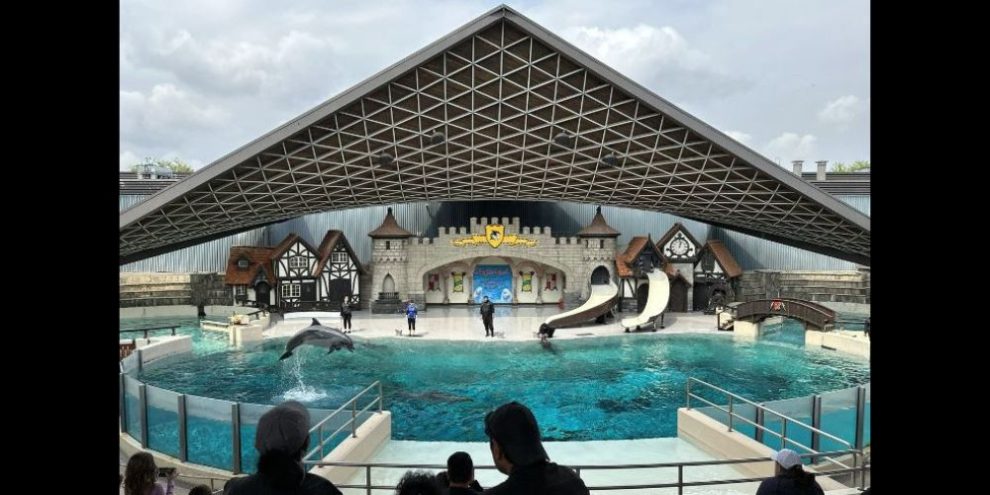
By Liam Casey in Toronto
Two months after the deaths of 14 whales and a dolphin at Marineland came to light, Ontario has refused to make public any steps taken to improve animal safety at the park, as critics demand action and transparency.
In August, The Canadian Press published figures on recent animal deaths at the Niagara Falls tourist attraction. The data was contained in a list created by the Ministry of the Solicitor General as part of a freedom-of-information request.
With Marineland now closed for the off-season, the government is saying little publicly about its ongoing probe of the park, which began when the province took over enforcing animal cruelty laws from the Ontario Society for the Prevention of Cruelty to Animals.
The Ministry of the Solicitor General has not revealed details of its investigation, including the causes of death for the animals.
Solicitor General Michael Kerzner did not answer questions about what action Animal Welfare Services inspectors have taken at Marineland or about what critics have called a lack of transparency.
"We take animal welfare very seriously," Kerzner said after an unrelated committee meeting in September.
"There's been a number of visits to Marineland in the last few years and we have full confidence in our animal welfare inspectors and in the legislation that we have."
A follow-up email from his office in October in response to further questions was identical to a statement in May.
"AWS continues to conduct compliance inspections at Marineland to determine if the standards of care are being met," wrote Chelsea McGee, Kerzner's spokeswoman.
"As previously shown, AWS will not hesitate to issue orders if Marineland is not in compliance with all rules, regulations, and standards of care regarding the welfare of animals."
McGee said the ministry could not provide further information "due to the ongoing inspection."
Wayne Gates, a provincial New Democrat legislator and the representative for Niagara Falls, called the animal deaths "disturbing" and said "the government needs to act."
"Marineland needs to be held to account," he said.
Interim Liberal Leader John Fraser said the deaths were "incredible and concerning" and wondered why that information was not made public earlier.
"There's no action taken, no transparency," he said. "The government should tell people what's happening to correct the situation there."
Green Party Leader Mike Schreiner called for the government to immediately shut down Marineland.
"The province needs to take over management of it because the existing Marineland management can't handle it," he said.
All but two of the 15 marine mammal deaths were among the park's beluga whales.
Twelve of the beluga deaths occurred within a two-year window between October 2019 and November 2021. Three more deaths occurred this year, including Kiska, Canada's last remaining captive killer whale.
During that time, provincial authorities raised concerns about the park's water quality and had declared all of the marine mammals were under distress. The province told the park in May 2021 to fix its water, an order Marineland appealed, saying its animals were not in distress.
Marineland did not respond to multiple requests for comment about the health of its animals, but says on its website that it has a "strong record" of providing for the welfare of its animals and will "continue to prioritize their health and well-being."
In the spring, the ministry said it had been to Marineland more than 160 times, but it's unknown how many times, or if, it has visited since.
Phil Demers, a former trainer at Marineland who quit and spoke out about conditions of marine mammals at the park, said the province needs to act.
"All these whales have died on the province's watch and they were supposed to make animals' lives better at Marineland and other places, but they are obviously failing," he said. "It's just the same old stuff where people just continue to push the buck."
Two animal rights organizations said the province needs to overhaul how it communicates with the public when it comes to animal welfare investigations.
"I am disappointed that nothing has seemingly changed since that Marineland revelation was made public," said Camille Labchuk, executive director of Animal Justice.
"Four years ago when we got public enforcement of animal cruelty laws, everyone expected the situation to get better. We expected more transparency, we expected more action from the province and, tragically, when it comes to transparency, it's enraging, but the situation is far worse."
World Animal Protection Canada, which often files detailed complaints to the province about alleged cruelty incidents, including at so-called roadside zoos, said it's hard to know what comes of its complaints to the government.
"We want to be able to work with the government to make sure that these animals are sufficiently protected," said Michele Hamers, the organization's wildlife campaign manager. "We have no idea what's going on."
This report by The Canadian Press was first published Oct. 18, 2023
Banner image via The Canadian Press





